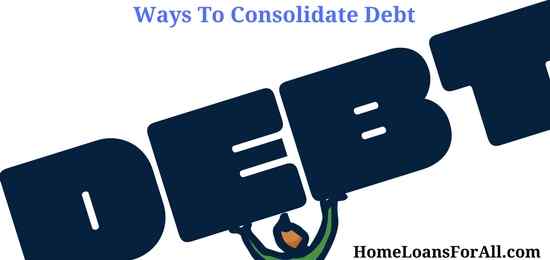
Consumer debt is a financial concern for millions of Americans, with the average credit card balance coming in at just under $6,000. Although debt can be used as a means to an end when financial emergencies arise, the cost of carrying debt for an extended period of time is high for most adults. That’s because the average interest rate on a credit card is slightly more than 15%, leaving credit card holders with an outstanding balance seemingly paying on the same debt for years. Debt consolidation is a tool that can be used to get out from under the burdens of credit card debt and the high interest rates that go hand in hand. First, though, it is necessary to understand how to consolidate debt, what debt consolidation is – and what it isn’t.
Breaking down Debt Consolidation
Debt consolidation is simply the process of paying off one or more high-interest rate debts with a single, fixed payment debt. For most consumers, debt consolidation requires taking out a new fixed personal loan that is unsecured and using the loan proceeds to pay off credit cards, short-term debt, or other outstanding credit items such as medical bills. For others, debt consolidation may mean utilizing a secured shorter-term loan to pay off outstanding balances, or opening a new credit card with a balance transfer option and paying off other debts with the available credit line. In any of these cases, debt consolidation should result in reducing multiple debts into a single monthly bill, reducing the total interest rate applied to the debt, or both.
Ways to Consolidate Debt
There are several options for well-qualified consumers when it comes to consolidating debt, each with their pros and cons. While this list is not extensive, the most realistic ways to consolidate debt include the following:
Credit card balance transfers: This option can combine credit card debt into one payment. There are hundreds of flavors of credit cards available on the market today. Some cater to individuals who appreciate the ability to earn rewards on purchases while others are more focused on helping consumers rebuild their credit through responsible spending and repayment. For debt consolidation, a handful of credit cards offer a shimmer of hope in the realm of lowering the total cost of carrying debt by offering zero-percent balance transfers to borrowers who qualify. With a balance transfer, an individual applies for and receive a new credit card and then using the available credit line to pay off other cards, bills, or loans. For a stated period of time, which ranges from 12 months up to 18 months in most cases, the amount of the balance transfer does not accrue any interest charges.
With this option, it is important to have a plan for repayment within the promotional balance transfer period, because interest is retroactively applied to any outstanding balance not paid off fully in that time frame.
Personal unsecured loans: Taking out an unsecured personal loan is another viable option for individuals with a strong credit history. Consumers may borrow up to $35,000 through most personal loan lenders, with the total amount offered dependent on income, other debt obligations, and credit score. A personal loan provides a way to consolidate debt into one payment and provides a lump sum which can be used to pay off high-interest debt, and borrowers repay a fixed monthly amount over the life of the loan. For most personal loans, the repayment term ranges from one to five years, and the interest rate can be significantly lower than a credit card.
Home equity loans: Homeowners who have high-interest debt may be able to tap into the accumulated equity in their primary residence as a strategy for debt consolidation. No matter if it’s an FHA home loan, a VA loan or practically any other mortgage you may have, you can usually tap into your equity. Through a home equity loan or line of credit, homeowners can borrow up to certain limits and use the funds to pay any outstanding debts they need or want to reduce or altogether get rid of. The benefit of using home equity is twofold: the interest rates offered on loans and lines of credit are the lowest of all available debt consolidation options (aside from zero-percent balance transfers), and repayment can extend for ten years or more.
Although debt consolidation is a smart choice for those struggling to get out from under the burden of high-interest rate consumer debt, there are caveats with each option. Borrowers should consider the new interest rate, the time frame for repayment, and the ability to fully repay the balance prior to taking out a new credit vehicle to pay down outstanding debt. Before taking a step toward debt consolidation, individuals should also commit to not add to credit cards or other debts if possible.











